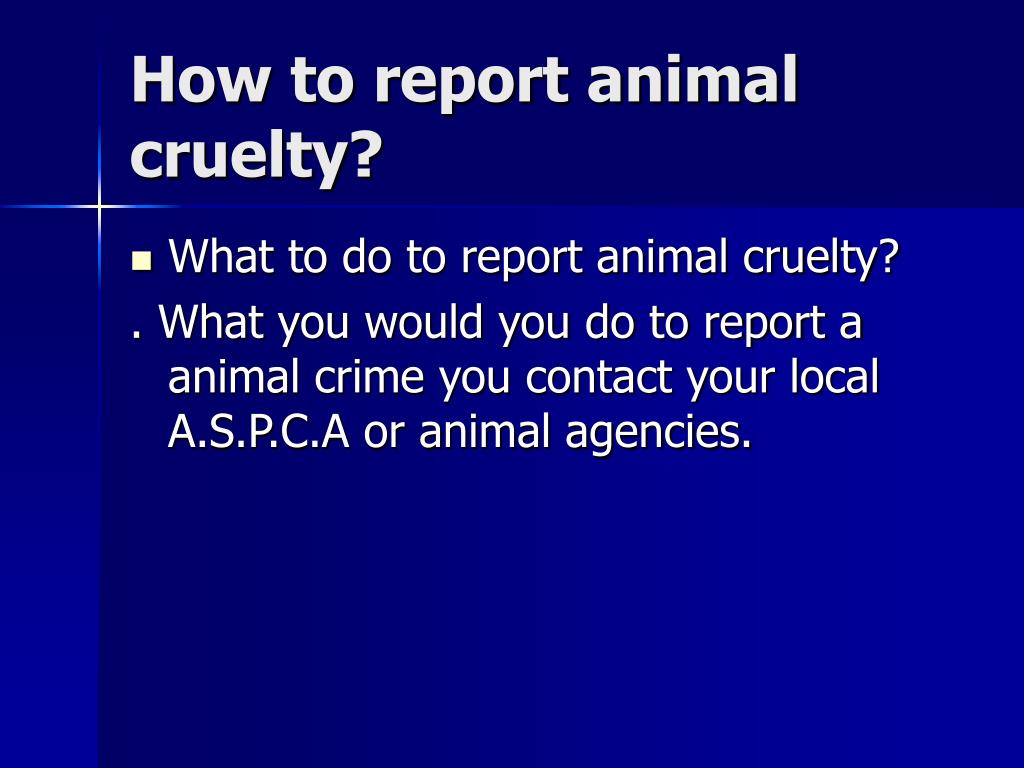Animal cruelty remains an abhorrent and pervasive issue that demands immediate attention and decisive action. Many individuals may witness instances of neglect or abuse but hesitate to intervene due to fear of repercussions. Have you ever wondered how you can voice your concerns without exposing your identity? This inquiry prompts a vital discussion about effective ways to report animal cruelty while maintaining anonymity.
To navigate the challenge of reporting animal cruelty, one must first understand the various forms it can take. From outright physical abuse—like beating or torturing animals—to more insidious forms such as neglect, which may include depriving animals of food, water, and proper medical care, the spectrum is alarmingly broad. Each case warrants serious attention and intervention. However, how does one approach the process of reporting such offenses without revealing their identity?
Understanding the legal frameworks surrounding animal welfare laws is essential for anyone looking to lodge a complaint effectively. Different jurisdictions have specific agencies mandated to respond to animal cruelty complaints, often ranging from local animal control to state humane societies. Familiarity with these frameworks can significantly enhance the reporting process.
When considering how to file a complaint anonymously, start by compiling as many details as possible regarding the incident. Note the location, time, and nature of the cruelty witnessed. If feasible, document the situation with photographs or videos, as visual evidence can substantially bolster the case. Are the conditions particularly egregious? Visual documentation can often be a game-changer when it comes to prompting action.
Once equipped with the requisite information, your next step is to identify the appropriate authority. Often, local animal control agencies have established channels for anonymous reporting. These channels can include hotlines or online forms. In some cases, it may even be feasible to report via a third-party organization specializing in animal rights, which can act as an intermediary between you and the authorities.
However, one may encounter a conundrum here: while anonymity is a vital concern, how do you ensure your complaint is taken seriously without the backing of an identifiable source? This challenge underscores the importance of providing as much detailed and irrefutable evidence as possible. A well-documented complaint can stand on its own merit, regardless of whether the complainant is known.
Moreover, engaging with local and national animal welfare organizations can serve as a potent resource. Many organizations offer guidance and resources for individuals wishing to report animal cruelty, often providing an anonymous platform for concerns to be aired. Your local animal shelter or a national organization, such as the ASPCA or Humane Society, can furnish additional clarity and might even assist in escalating the situation if necessary.
While technological advancements bolster anonymous reporting mechanisms, they also create challenges. Social media platforms and neighborhood apps can serve as double-edged swords. Use caution when sharing incidents online; while it may seem harmless, jumping into digital forums may inadvertently jeopardize your anonymity. Sometimes, online sensationalism can diminish the seriousness of the matter at hand. Therefore, when using digital platforms, approach them as a facilitated tool rather than a primary avenue for addressing serious concerns.
To fully leverage your potential impact, consider forming coalitions with fellow animal advocates. Join local groups focused on animal rights and welfare; often, collective complaints can be more impactful. Collaboration fosters a broader base of support and resources, allowing for a more concerted effort in addressing and combating animal cruelty.
Yet, it is crucial to be tactful. Activism can be met with resistance, and some individuals may harbor misconceptions regarding what constitutes animal cruelty. Therefore, strive for education. Raising awareness in your community about the signs of animal cruelty and the importance of reporting can prompt proactive measures by others who might be inclined to join you in your efforts. In doing so, anonymity is maintained, but the collective voice grows more substantial.
In unforeseen circumstances where immediate action is warranted, or the situation poses a risk to human life, contacting law enforcement should not be dismissed. Emergency response agencies can intervene swiftly, although one must remain cognizant of how to maintain anonymity in such situations. Often, reporting at the municipal level can leave pathways for further investigation while obscuring individuals’ identities.
It is vital to remember that even after a report is lodged, individuals should remain vigilant. Continuous observation of the reported situation can yield critical information and serve as evidence for follow-up claims. Awareness, education, and continuous advocacy are essential in combating persistent issues within the realm of animal welfare.
Ultimately, the act of anonymously reporting animal cruelty is not simply a privilege but a responsibility that each of us holds. With each complaint lodged, each community educated, and each situation documented, we forge a collective force against cruelty. Through our resolute actions, we can challenge the status quo and create an environment where every creature is afforded the dignity and respect they inherently deserve. The journey is demanding, but through strategic planning and communal efforts, we can amplify the message against animal cruelty—one report at a time.








